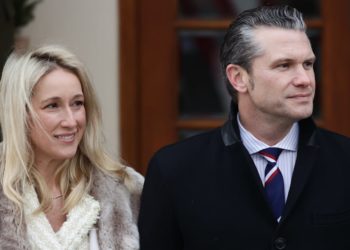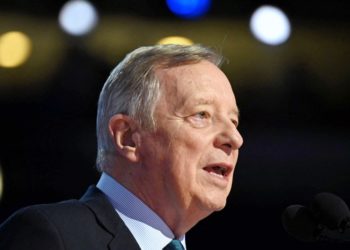He arrives at campaign events like a well-preserved relic of the political past, a little leaner and more gray, but spry enough to extract himself from behind the wheel of his muscle car of the moment, a sleek Dodge Charger.
Questions?
He’ll take a few, perhaps, but only after the event — typically a Sunday visit to a Black church in New York City.
Will he attend the next Democratic mayoral forum?
Probably not, especially if the other candidates, who trail him in the polls, might be onstage with him. But if given a chance to speak alone, unencumbered by rivals who might draw attention to the scandals that led to his resignation as governor in 2021, Andrew M. Cuomo may well be interested.
In his comeback run for mayor of New York City, Mr. Cuomo has fully embraced a so-called Rose Garden strategy, attending a small number of orchestrated events that allow him to avoid confrontational interactions with his opponents.
As governor, Mr. Cuomo used the strategy in his re-election efforts. As a mayoral candidate, he is doing so again — even without the benefit of incumbency.
That has drawn broad criticism from his rivals, including the actual incumbent, Mayor Eric Adams, who said Mr. Cuomo was hiding “in the shadows” and not facing the scrutiny that all candidates should.
“He’s in this bubble — you can’t even get near him,” the mayor said at one of his weekly news conferences last month, adding: “He controls walking in. He controls walking out. He’s not answering questions from you.”
On Wednesday evening, Mr. Cuomo will attend a major candidate forum held by the Brooklyn Democratic Party, whose leader recently endorsed him. The format of the event, which focuses on the “Black agenda” in the city, will allow Mr. Cuomo and the other candidates to each appear individually.
A Rose Garden strategy is typically deployed by American presidents and other officeholders as a way of controlling the campaign narrative and avoiding gaffes or criticism — both of which may be of concern to Mr. Cuomo.
His opponents have criticized him in absentia, focusing on his handling of nursing home deaths during the pandemic and the sexual harassment allegations by 11 women that forced him from office. Mr. Cuomo has denied wrongdoing.
Zohran Mamdani, a state lawmaker who is in second place behind Mr. Cuomo in polls, said that Mr. Cuomo had “no good answers” for making cuts to Medicaid and the transit system while governor, and for presiding over a culture of leadership where sexual harassment seemed prevalent.
“Andrew Cuomo knows that engaging New Yorkers in public and taking questions from the press is a huge risk to his campaign, as he’d actually have to answer for his dismal record,” Mr. Mamdani said.
Mr. Cuomo has been busy trying to maintain his front-runner status. He has secured major endorsements and raised a large campaign war chest. A super PAC backing him has raised even more — roughly $5 million, including $250,000 from Bill Ackman, a hedge fund executive and supporter of President Trump.
Rich Azzopardi, a spokesman for the Cuomo campaign, said in a statement that “forums don’t reach people” and that Mr. Cuomo preferred to talk directly with New Yorkers about their concerns.
“New Yorkers know the governor, his real record of results and that he’s the only one with the experience and the skill to fix what’s broken in this city,” he said.
But even as he operates mostly away from public scrutiny, Mr. Cuomo has still experienced some campaign hiccups.
He was criticized over the apparent use of artificial intelligence in his housing proposal, and his request for public matching funds was rejected because of what his campaign said were “technical software” issues. On Monday, a Republican House committee chairman renewed a call for the Justice Department to prosecute Mr. Cuomo for allegedly making false statements to Congress about his actions during the pandemic.
When Mr. Cuomo does make campaign appearances, it is often to receive endorsements or to speak at church services. He has given longer interviews to The Daily Beast and to the sports host Stephen A. Smith; he also spent two contentious hours with The New York Post editorial board.
Mayoral candidates typically attend forums held by civic groups, take questions from local reporters and interact with New Yorkers in unscripted moments. Andrew Yang, the early front-runner in the 2021 mayoral race, and Mr. Adams regularly held news conferences on the campaign trail and attended candidate forums.
Mr. Cuomo might not appear face-to-face with his rivals until the first of two televised debates is held on June 4, roughly three weeks before the June 24 primary.
Basil Smikle, the former executive director of the New York State Democratic Party, said that Mr. Cuomo had taken a similar approach as governor, when he did not frequently engage in retail politics or provide regular access to statehouse reporters.
“There is an intimacy that voters expect of their mayor that they don’t necessarily expect from a governor,” Mr. Smikle said. “He’s going to have to connect more.”
Mr. Adams, who has record-low approval ratings and is running for re-election as an independent in the general election in November, has also mostly avoided attending mayoral forums.
He did attend, along with Mr. Cuomo, a forum held by the Rev. Al Sharpton earlier this month where the candidates appeared onstage individually for separate interviews. Mr. Sharpton praised Mr. Cuomo for coming to his forum and answering questions directly.
“Everybody has the right to their own strategy,” Mr. Sharpton said in an interview. “The fact that he has a household name means it might not be as necessary for him as candidates who are not as well known.”
Mr. Mamdani has attended 29 mayoral forums and committed to at least five more, his campaign said. He did not participate in a two-hour forum on Monday that focused on affordability, joining Mr. Cuomo on the sidelines after previously confirming that he would attend. Mr. Mamdani’s campaign said that he was traveling to Albany on Monday and was focused on the state’s stalled budget negotiations. Organizers of that event, at which the candidates appeared onstage together, said Mr. Cuomo had not responded to their invitations to join the forum.
The structure of the forum on Wednesday in Brooklyn has also drawn attention, with the organizers being accused of changing the format to allow the candidates to appear one at a time, as reported by Politico.
The organizers denied that they had changed the format of the event. But one person involved in the planning, as well as a staff member of one of the campaigns, said that the format was supposed to involve multiple candidates onstage at the same time.
An email on April 6 from the organizers to one of the campaigns said that candidates would appear in two groups of four. A week later, the organizers said that the candidates would instead appear one at a time, according to the campaign staff member, who requested anonymity.
Henry Butler, vice chairman of the Brooklyn Democratic Party, insisted that the planners of the forum, at Medgar Evers College in Brooklyn, had decided that the best format to facilitate a “substantive” discussion was to have the candidates onstage by themselves.
“We did not want a situation of candidates yelling and screaming, going back and forth at each other and not answering the specific questions,” Mr. Butler said.
If all the candidates were onstage together, they could “avoid answering the questions about what you plan to do and what you have done in the past for the Black community,” he added, citing Mr. Sharpton’s forum as a model.
Many of the candidates are frustrated that they cannot engage with Mr. Cuomo directly. One challenger, State Senator Jessica Ramos, said that the former governor “thinks he is above questions from the public and the press.”
“It leaves us to wonder whether he doesn’t want the public to see how his unscripted performance level has deteriorated,” she said.
Zellnor Myrie, a state senator from Brooklyn, said Mr. Cuomo was avoiding forums because he was scared to discuss “his failed housing legacy.” Scott M. Stringer, the former city comptroller, said Mr. Cuomo had “no plans of his own” and that his record had “actively hurt the city.”
Lupe Todd-Medina, a spokeswoman for Adrienne Adams, the speaker of the City Council who is running for mayor, said that voters wanted a leader who was not afraid to engage with opponents in public.
“If he’s too afraid to share a stage with other candidates,” she said of Mr. Cuomo, “how can we trust him to stand up to Trump?”
Emma G. Fitzsimmons is the City Hall bureau chief for The Times, covering Mayor Eric Adams and his administration.
Jeffery C. Mays is a Times reporter covering politics with a focus on New York City Hall.
The post Cuomo’s Campaign Strategy: Limit Appearances and Avoid Confrontation appeared first on New York Times.




